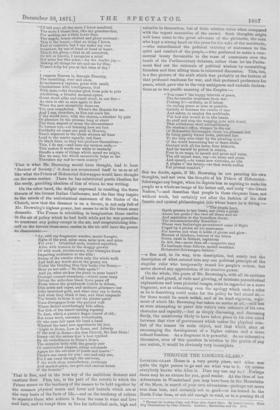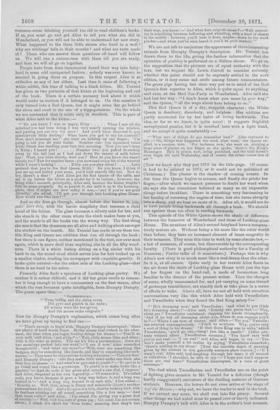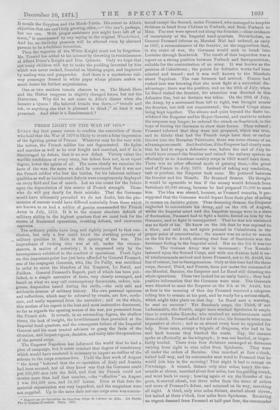THROUGH THE LOOKING-GLASS.*
LOOKING-GLASS House is a very pretty place, and Alice was quite the right person to go and see what was in it. Of course everybody knows who Alice is. Does any one say no ? Perhaps there may be an excuse for you, good reader. At the time of her Adventures in Wonderland you may have been in the Mountains of the Moon, in search of your own adventures—perhaps not more true than hers, and certainly not so good—or ioe-bouud in the North Polar Seas, or not old enough to read, or in a passing fit of * Through the Looking-Glass, aria What Aided Found There, By Lewis Carroll. With fifty Illustrations by John Tenuiel. London; Macmillan and Co. 1872.
common.sense thinking yourself too old to read children's books. If so, you must go and get Alice to tell you what she did in Wonderland, or you will not be able to understand her new story. What happened to the three little sisters who lived in a well ? why are whitings' tails in their mouths ? and what are tarts made of ? Those who can answer these questions off-hand will follow us. We will run a caucus-race with them till you are ready, and then we will all go on together.
People have from time immemorial found their way into fairy- land in some odd unexpected fashion : nobody was ever known to succeed in going there on purpose. In this respect Alice is as orthodox as any of her elders. Last time it came of following a white rabbit, this time of talking to a black kitten. Mr. Tenniel has given us two portraits of that kitten at the beginning and end of the book. There is a certain uncanny look about it which would make us anxious if it belonged to us. On this occasion it only turned into a Red Queen, but it might some day go behind the stove and swell to the size of a hippopotamus. On the whole we are contented that it exists only in woodcut. This is part of what Alice said to gin kitten :—
" Do you know, I was so angry, Kitty When I saw all the
mischief you had been doing, I was very nearly opening the window, and putting you out into the snow ! And you'd have deserved it, you mischievous little darling ! What have you got to say for yourself ? Now, don't interrupt me l' she went on, holding up one finger ; 'I'm going to toll you all your faults. Number one you squeaked twice while Dinah was washing your face this morning. Now you can't deny it, Kitty I hoard you I Number two : you pulled Snowdrop away by the tail just 55 I had put down the saucer of milk before her What, you were thirsty, wore you ? How do you know she wasn't thirsty too? Now for number three : you unwound every bit of the worsted while I wasn't looking Kitty, can you play chess? Let's pretend that you're the Red Queen, Kitty ! Do you know, I think if you sat up and folded your arms, you'd look exactly like her. Now do try, there's a dear! ' And Alice got the Red Queen off the table, and set it up before the kitten as a model for it to imitate ; however, the thing didn't succeed, principally, Alice said, because the kitten wouldn't fold its arms properly. So, to punish it, she held it up to the Looking- glass, that it might see how sulky it was,—'and if you're not good directly,' she added, I'll put you through into Looking-glass Rouse. How would you like that " And so she does go through, almost before she knows it, tis-ss, 19-4dX' cZers de4c, with the heroic simplicity that beseems a child loved of the fairies. The glass becomes a silvery mist for her, and she stands in the other room where the clock makes faces at you, and the words in all the books run the wrong way. The first thing , she sees is that the chessmen are all alive and walking about amongst the cinders on the hearth. Mr. Tenniel has made us see them too. His King and Queen are oddities that run all through the book ; but there is one figure, neither mentioned in the text, nor ever seen again, which is more droll than anything else in all the fifty wood- cuts. There i a white bishop sitting on a big cinder with his back to us, the round stool which serves him for feet tucked up on a smaller cinder, reading his newspaper with exquisite gravity. It looks quite natural—for the other side of the Looking-glass—that there is no head in his mitre.
Presently Alice finds a specimen of Looking-glass poetry. We confess it is rather difficult, and it did her great credit to remem- ber it long enough to have a commentary on the first stanza, after which the rest becomes quite intelligible, from Humpty Dumpty. The poem opens thus :—
"JABBERWOCKY.
" 'Twas brillig, and the slithy Oyes Did gyre and gimble in the wabe ; All minnry were the borogoves, And the memo raths outgrabe."
Now for Humpty Dumpty's explanation, which comes long after we have given up trying to find one:—
" That's enough to begin.with,' Hurepty Dumpty interrupted ; 'there are plenty of hard words there. Brialy means Nur o'clock in the after- noon, the time when you begin broiling things for dinner.',—' That'll do very well,' said Alice, 'and Well, siithy means lithe and slimy; lithe is the same as active. You see it's like a portmanteau ; there are two meanings packed into one word.'—'I see it now,' Aliao remarked thoughtfully ; 'and what are Loves f'—' Well, Loves are something like badgers, they're something like lizards, and they're something like cork- serews.'—"r They must be very curious-looking creatures.'—‘They aro that,' said Hunipty Dumpty ; 'also they make their noels under sun-dials, also they live on cheese. And what's to gyre and to !limbic 2'—' To gyre is to go round and round like a gyroscope. To gimble is to make holes like a glmblet.'—' And the wabe is the grass-plot round a sun-dial, I suppose,' said Alice, surprised at her own ingenuity.—' Of course it is. It's called wabe, you know, because it goes a long way before it, and a long way behind And a long way beyond it on each side,' Alice added.— Exactl,y,so. Well, then, raintry is flimsy and miserable (there's another portmanteau for you). And a Lei ogove is a thin, shabby-looking bird, with its feathers sticking out all round, something like a live mop.'—' And then nionie milts 9' said Alice. ' rm afraid I'm giving you a great deal of trouble.'—' Well, rad, is a sort of green pig ; but nioine I'm not certain about; I think it's short for 'from home,' meaning that they'd lost their way, you know.'—' And what does outgrabemean?'—'Well, outgrab- hug is something between bellowing and whistling, with a kind of sneeze, in the middle : however, you'll bear it done, maybe—down in the wood yonder—and when you've once heard it you'll be quite content.' "
We arc not left to conjecture the appearance of these interesting animals from Hutnpty Dunapty's description. Mr. Tenniel has
drawn them to the life, giving the further information that the operation of ginibling is performed on a Stilton cheese. We go on the supposition that the pictures are of equal authority with the text, but we request Mr. Lewis Carroll to consider seriously
whether this point should not bo expressly settled in the next edition, or it may cause sad strife among future commentators.
The green pigs having lost their way put us in mind of the Red Queen's first repartee to Alice, which is quite equal to anything said even at the Mad Tea-Party in Wonderland. Alice said she had lost her way : "I don't know what you mean by your way,"' said the Queen, " all the ways about here belong to me."
This Red Queen is of a dry, snappish character ; the White. Queen is desultory, disorderly, and helpless. Her oddities are
partly accounted for by her habit of living backwards. The idea, so far as we know, is quite novel : it suggests frightful metaphysical puzzles, but it is touched here with a light hand, and we accept it quite comfortably :— "What sort of things do you remember best?' Alice ventured to ask.—' Oh, things that happened the week after next,' the Queen re- plied, in a careless tone, For instance, now,' she went on, sticking a largo piece of plaster on her firiger as she spoke, ' there's the King's Messenger. He's in prison now, being punished, and the trial doesn't even begin till next Wednesday, and of course the crime comes last or all.'" (Now we know why they put 1872 'on the title-page. Of course it had to be- printed in 1872, or it could not be published at Christmas.) The plaster is the shadow of coming events. In due time the Queen begins to scream, and finally she pricks her finger,—after which we cannot presume to doubt her word when she says she has sometimes believed as many as six impossible things before breakfast. There is something very fascinating in her faculty of reversing the engine of time, but she turns abruptly into a sheep, and we hear no more of it. After all, it would not do. to have people living backwards all through a book. We should run against them too often in reading forwards.
This episode of the White Queen shows the shade of differenee between the humours of Wonderland and those of Looking-glass. House. The creations of Alice's second fairyland have a compara- tively mature air. Without being a bit more like the outer world than before, they have an increased element of inner congruity its their nonsense. They seem this time to work by HOMO obscure law,— a law of nonsense, of course, but discoverable by the corresponding faculty. (There is good philosophical authority for a Faculty of Nonsense ; Ferrier talks of it somewhere.) Perhaps this is why Alice's new story is so much more like a real dream than the other. So it is, at all events. Quite early in her travels Alice floats in the air down the stairs of Looking-glass House with just the tips. of her fingers on the hand-rail, a mode of locomotion long familiar to the dreams of the present writer. Thou the change& of scene, wholly unaccounted for, and yet carrying on some thread of grotesque resemblance, are exactly such as take place in a series. of efforts to wake. Above all, have we not all held with ourselves. conversations very like this which Alice held with Tweedledmun, and Tweedledee when they found the Red King asleep ?— " He's dreaming now,' said Twoodledee ; 'and what do you think he's dreaming about ?'—Alice said, 'Nobody can guess that.'—' Why,. about you." Tweedledee exclaimed, clapping his hands triumphantly And if be left off dreaming about you, where do you suppose you'd be ?'—' Whore I am now, of course,' said Alice.—'Not you!' Tweedle- deo retorted contemptuously. 'You'd be nowhere. Why, you're only a sort of thing in his dream.' 'If that there King was to wake,' added Tweedledum, 'you'd go out,—bang I just like a candle!' [Alice pro- tests without effect. Tweedledum resumes.] 'You know very well, you're not real.' — am real!' said Allot), and began to cry. —' You won't make yourself a hit realler by crying,' Tweedledee remarked 'theme's nothing to cry about.' [Note the horrible depth of moaning given by the context to this generally common-place remark.]—' If I wasn't meal,' Alice said, half-laughing through her tears, it all seemed so ridiculous, shouldn't be able to cry.'—' I hope you don't suppose those aro real tears ?' Twoodledum interrupted, in A tone of great contempt."
The duel which Tweedledum and Tweedledee are on the point of fighting gives occasion to Mr. Tenniel for a delicious (though hardly exaggerated) caricature of the duelling costume of German students, However, the heroes do not even arrive at the stage of itruc die Mensur,—why not, we leave the reader to seek in the book. If we extract any more, we shall run into flat piracy. Severall other timings we had noted must be passed over or barely indicated. Humpty Dumpty's talk with Alice is in the author's best mannee. It recalls the Gryphon and the Mock-Turtle. His retort to Alice's objection that one can't help growing older,—" One can't, perhaps, but two can. With proper assistance you might have left off at seven," is unsurpassed by any saying in the original Wonderland, And his un-birthday presents will be allowed even by alarmed parents to be a-brilliant invention.
Then the vagaries of the White Knight must not be forgotten. Mr. Tenniel has added to his interest by throwing in reminiscences of Albert Diirer's Knight and Don Quixote. Only we hope that not many children will try to make the pudding invented by him which was never cooked, founded on blotting-paper, and improved by sealing-wax and gunpowder. And there is a mysterious rail- way passenger dressed in white paper whose picture makes us much desire his further acquaintance.
One or two matters remain obscure to us. The March Hare and the Hatter reappear in slightly changed forms, but not the Dormouse. Why did he not come to Alice's dinner when she became a Queen ? His beloved treacle was there,—" treacle and ink, or anything else that is pleasant to drink ;" at least it was promised. And what is a Bandersnateh ?




































 Previous page
Previous page